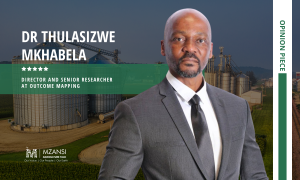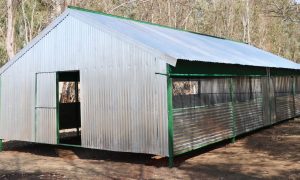The Food Systems Research Networks for Africa (FSNet-Africa) Project Policy Impact Training Workshop is underway at the University of Pretoria’s Graduate Centre.
The workshop kicked off on Monday October 9 and is expected to run until October 13.
The five-day Policy Impact Training Workshop aims to equip ECRFs with the competencies to align their research findings to relevant policy making, thus ensuring positive impact on how policy is formed, implemented, and understood.
FSNet-Africa is a collaborative initiative between the University of Pretoria, the University of Leeds (UK), and the Food Agriculture and Natural Resources Policy Analysis Network (FANRPAN).
It is a research excellence project funded by the Global Challenges Research Fund (GCRF) through the African Research Universities Alliance (ARUA) – United Kingdom Research and Innovation (UKRI) partnership.
Food, Agriculture and Natural Resources Policy Analysis Network (FANRPAN) CEO and Head of Mission Dr Tshilidzi Madzivhandila said the FSNet-Africa project seeks to strengthen food systems research capabilities and translate evidence into implementable policy solutions and practical interventions in support of the Sustainable Development Goals (SDG) targets for Africa. This will be achieved through leading systems analysis research on climate smart, nutrition-sensitive, and poverty-reducing food system solutions designed and implemented in partnership with relevant food systems stakeholders.
Dr Madzivhandila said fellows have been selected from six countries – Ghana, Kenya, Malawi, South Africa, Tanzania, and Zambia. The participating institutions in these six focus countries are the University of Ghana and Kwame Nkrumah University of Science and Technology (KNUST; Ghana); University of Zambia (Zambia), University of Dar es Salaam, and Sokoine University of Agriculture (Tanzania); Lilongwe University of Agriculture and Natural Resources (LUANAR) and Malawi University of Science and Technology (MUST; Malawi); University of Nairobi (Kenya); and University of Pretoria (UP) and University of the Western Cape (South Africa). In addition, 15 AECRM (Africa Early Career Researchers Meeting) fellows funded by Carnegie will join the Policy Impact training workshop.
FSNet-Africa created structured opportunities for up to 20 early career research fellows (ECRFs) who obtained their PhD within the last ten years (majority female) in the focus countries to conduct impact focused interdisciplinary research, and build lasting research networks and develop their skills to design and implement gender sensitive research with non-academic stakeholders. The project carefully matched and initiated formal mentorship relationships between fellows and established scientists in the UK and Africa to form interdisciplinary research “triads” to create long-term collaborations and networks.
All attendees were welcomed by Madzivhandila before Mr Francis Hale gave a lesson on the Art of Presentation.
Hale encouraged the audience to start with key issues when making a presentation.
“Make language clear and easy to read and understand, keep paragraphs short.
“Rephrase language so it doesn’t sound like a project report,” he said.
Sharing his opening remarks, the Director General of the Department of Agriculture Land Reform and Rural Development (DALRRD) Mooketsa Ramasodi offered his department’s support to the work being done by researchers.
“Food systems that comes from your research will be the ones we use. It should also be taken to the African Union so that it can be implemented throughout the country,” said Ramasodi.
Ramasodi added that South Africa its two agricultures (commercial and small holding) which sometimes provide a challenge on approach can be transformed and sustained at the same time.
Ramasodi concluded by saying that sustainable partnerships are needed to ensure that “we deal with food instability in the country”.
President of the World Farmers’ Organization (WFO) and Executive Board Chairman of the South African Agri Initiative (SAAI) Dr Theo de Jager, said that farming is not in harmony with nature.
“Nature does not provide surpluses but farming needs surpluses,” he said.
He said farmers union do advocacy for farmers to influence policy which must be science based in order for farming to remain profitable.
Dr De Jager said that even though science is expensive it is needed to give our countries the edge in a competitive world.
Research must give us the edge in a competitive world
“We must get to the cutting edge where we break new ground but without the budget for research, we will fall out.”
He said poverty and hunger is the war of our generation.
“The only way to defeat hunger and poverty is by creating wealth, of which agriculture can.
However we are not going do it with hand hoes. We need modernization, mechanization, and commercialization.
“We must work ourselves out of the situations,” states De Jager.
He added that as farmers they are opposed to talks about people moving away from animals based protein to plant based protein, especially those saying livestock farming bad for nature and the environment
“As farmers they are not against science but against the onslaught on animals,” he said.
Livestock farming bad for nature, bad for the environment
He concluded by saying that science must translated into a farmer’s language.
The second day of the event saw presentations from Sifiso Ntombela, a South African developmental economist with keen interest in economic modelling and agricultural policies.
Ntombela is currently working as the Special Advisor to Minister Thoko Didiza, in the Department of Agriculture, Land Reform and Rural Development, is also the Vice-President for the Agricultural Economics Association of South Africa.
The policy impact training continues until Friday, October 13.



















